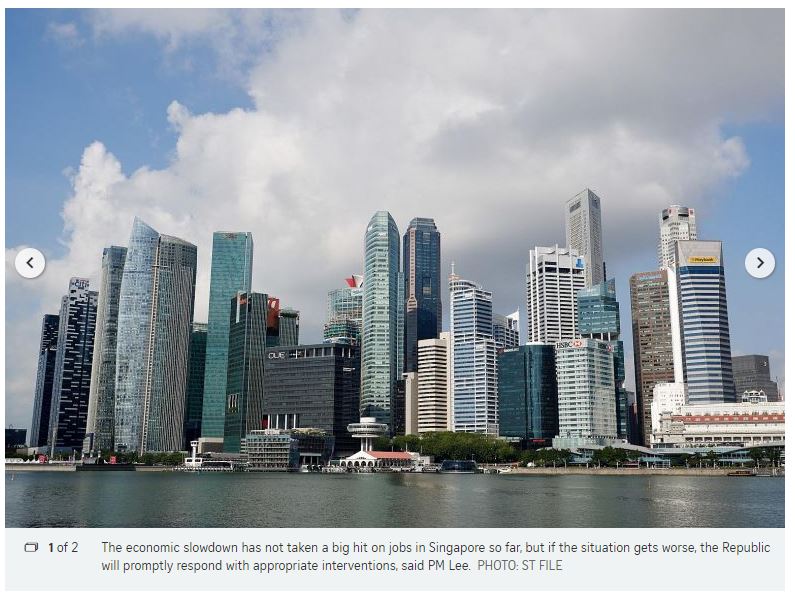National Day Rally 2019: Singapore’s economic growth has slowed but stimulus measures not required yet
SINGAPORE – Singapore’s economic growth may have slowed significantly this year but the current situation does not warrant stimulus measures just yet, Prime Minister Lee Hsien Loong said on Sunday (Aug 18).
If the situation gets much worse, however, the Republic will “promptly respond with appropriate interventions to sustain the livelihoods of our workers”, he added.
While workers are worried, the slowdown has not taken a big hit on jobs so far, he said in his Mandarin speech at during the National Day Rally at the Institute of Technical Education College Central campus in Ang Mo Kio.
“We have experienced cyclical downturns like this in the past, and we are confident we can take this one in our stride,” he said, stressing that the Government and union leaders are watching trends closely and are prepared to take action.
He outlined Singapore’s economic situation, noting that growth has slowed mainly due to the weakening of global demand and international trade.
This has affected the manufacturing sector and trade-related services.
A slump in electronics has impacted overall performance as well, especially in related areas such as precision engineering and wholesale trade. Retail continues to face pressure from online shopping.
But Mr Lee highlighted that other sectors have not been affected for now, with retrenchments and unemployment rates remaining low.
This is why the current situation does not call for immediate stimulus measures.
Even so, he said Singapore has to start preparing for new realities ahead, given that the external environment is challenging.
Trade tensions between the United States and China are expected to adversely impact the world economy. This is already hurting confidence worldwide, with deeper and broader effects to come.
“Supply chains will be disrupted, investments and research and development will be restricted, people-to-people exchanges will be constrained,” said Mr Lee.
For example, smartphones today contain components designed and assembled in different countries. But if the US does not allow its firms to use components made in China, or to sell microchips to China, Chinese and American companies will have to make their own components, microchips, phones and telecommunications systems.
Such decoupling of the US and Chinese economies could affect Singaporeans, who may find themselves carrying multiple phones overseas in the future to suit local telecommunications systems, Mr Lee added.
Singapore is a small open economy that has benefited much from globalisation, said Mr Lee, adding that if US-China relations continue to worsen, the world will be increasingly polarised.
“Singapore’s economic growth will be affected, and our future will be a more troubled one,” he added. Local firms that export extensively to China will be hit, alongside those that have factories in China and export to the US.
Some think that firms which decide not to manufacture in China may come to Singapore, but Mr Lee said this is not the case. Clothing manufacturers, for example, will likely head to countries such as Vietnam and Bangladesh, which have a lower cost base or are nearer to major markets.
In spite of the external environment, Mr Lee stressed that Singapore has its strengths – such as an excellent reputation among investors.
The city-state has attracted several major investments this year, with Finnish oil company Neste investing over $2 billion to expand its renewable energy plant here.
“Faced with uncertain future economic prospects, we need to work all the harder to protect this trust that investors have in us,” he said.
Source: https://www.straitstimes.com/politics/national-day-rally-2019-economic-growth-has-slowed-but-stimulus-measures-not-required-yet


 Thailand
Thailand




